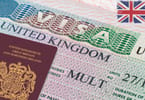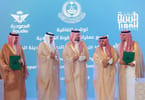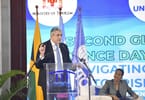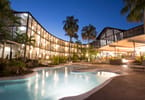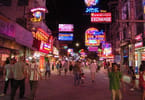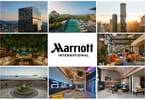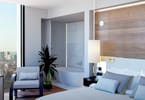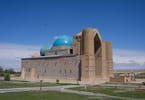Uber-wealthy politician/billionaire businessman Saad Hariri made his pledge on Saturday as the new presidential-appointed prime minister of Lebanon. He promised to work for national unity in a government that stands divided between Hezbollah, Shiite and Sunni lines and over a dozen other religion factions tearing the state apart.
The 39-year-old son of slain former Prime Minister Rafik Hariri faced major, serious challenges from the Iran-backed Hezbollah rivals and its allies in parliamentary elections earlier this month. However, in his acceptance speech, he has shown willingness to sit down with the Hezbollah leaders. Lebanese are hoping his stance marks a new start for a country constantly suffering since the 70s from political turmoil, assassinations, wars and sectarian street clashes – more pronounced in the past four years.
Hariri’s family’s business empire, based in Saudi Arabia, includes interests in construction and telecommunication. Saad has close ties to the royal family of Saudi Arabia, the Arab world’s economic powerhouse, and is a Saudi citizen too.
Saad’s father, the slain billionaire Rafik Hariri was the man behind Lebanon’s post-war reconstruction. Rafik was the architect of multi-million dollar investment Solidere from which downtown Beirut rose from its Dresden-type ruins to a lucrative, world-class tourism attraction. Hariri owned 10 per cent of the shares in Solidere and died within meters of his own empire from a 500 kg. bomb planted outside the wall on an empty hotel, the St. George Hotel.
Rebuilding Lebanon was Hariri’s ultimate goal since his first appointment as Prime Minister in October 1992, at the head of a government controlled by late Syrian leader Hafez Al Assad. With a profile showing strong ties with the Saudi Arabian aristocracy and the Syrians at the time, Hariri whose first term lasted till 1998 was the best bet to head the nationwide reconstruction, let alone finance portions of it.
In due time, Hariri’s empire called Solidere was born. A form of public-private partnership, Solidere got widely recognized as the most effective mechanism implementing large-scale urban regeneration. As a private development corporation established by government decree, it has a majority shareholding of all former owners and tenants of city center property. As the company responsible for rebuilding downtown Beirut, Solidere has been the centerpiece in Lebanon’s recovery.
Formed under Law 177 of 1991 as a private-sector company listed on the stock exchange, it is the firm responsible for rejuvenating the 1.8 million square meter war-ravaged Beirut Central District (BCD), the country’s largest private sector property and one of the largest Arab firms open to virtually all foreign investors. Owners were allowed to exchange property rights in the development in return for 2/3 of the company Class A shares totaled at $1.17 billion. The project was financed through the 65 million Class B shares issued at a total of $650 million. Also raised was $77 million from the international community through 6.7 million GDRs. Later, it would become the barometer of the country’s economy, affected by instability reflected by the stock prices.
But when Rafik left office in 1998, Solidere, however, saw its net profit slide by 93 percent in 1999 because of a depressed economy brought about by the worst recession and the government’s refusal to grant permits for construction. As a result, the deployment of the so-called Beirut Souks was delayed and frozen for much of 2000. Costing about $90 to 100 million, the 100,000 square meter souk project was the jewel in the crown of Solidere’s master plan, vital to the widespread rejuvenation of the downtown ville. Permits were also delayed as Hariri’s giant brickwall of a nemesis Saudi billionaire Prince Waled bin Talal bin Abdulaziz threatened to pull out of development plans for the Four Seasons Hotel in Beirut. Interior Minister Michel Murr caused the most delay as he was involved in a Solidere dispute on the question of ownership and payment for the Murr Tower in Hamra district. The ugly red tape saddled the economy already suffering from recession and crying out for financial help internally and otherwise.
Rafik Hariri was killed on February 14, 2005 in a massive bomb blast that left a crater 15 meters in radius, taking with him 17 others in his motorcade. The powerful explosion ripped through Beirut’s highly progressive, most upscale tourist district, damaging Beirut’s top landmark property the Phoenicia Inter-Continental, the Monroe Hotel on Kennedy Street, the Palm Beach, the Vendome Inter-Continental, Riviera Hotel on Ain el Mraisseh and the St. Georges Beach resort, marina and restaurant opposite the Phoenicia. All six hotels are along the seafront bin al Hassan Street, a famous tourist Corniche.
His death led to the forced exit of 15,000 Syrian troops, which ushered in a new level of optimism in the barometer of Lebanese economy that Solidere is.
Fresh from mourning, Hariri’s sister, Parliament Member Bahia Hariri, kept the legacy of her brother alive. Bahia looked beyond the multi-million dollar downtown complex of Solidere and set her sights southward for alternatives in tourism offers. Though still devastated by the attack, Bahia breathed life to her new project; her own hometown Sidon – a destination in the south which she sees as having great tourism potentials. Sidon was an Israeli military outpost until recent times. Mrs. Hariri also got busy raising investments for developing the Port of Saida where the Sea Castle fortress built by the Crusaders in the 13th century still stands. Alongside traditional tourism, Bahia introduced health tourism in the area by building medical facilities for visitors and locals.
Before long, Bahia supported her nephew Saad Hariri in the election campaign in an effort to restore Hariri’s vision of reform – national, economic, tourism, let alone political.
Last Saturday, Saad Hariri began his official career by paying respects to his father in downtown Beirut where the grave of his father which has sadly become sadly a tourism landmark. For Hariri’s death celebrates a change in Lebanon’s political management, the retreat of the Syrian military stronghold, Saad Hariri’s entry into politics and perhaps a second chance at rebuilding Lebanon.
WHAT TO TAKE AWAY FROM THIS ARTICLE:
- Interior Minister Michel Murr caused the most delay as he was involved in a Solidere dispute on the question of ownership and payment for the Murr Tower in Hamra district.
- With a profile showing strong ties with the Saudi Arabian aristocracy and the Syrians at the time, Hariri whose first term lasted till 1998 was the best bet to head the nationwide reconstruction, let alone finance portions of it.
- Costing about $90 to 100 million, the 100,000 square meter souk project was the jewel in the crown of Solidere’s master plan, vital to the widespread rejuvenation of the downtown ville.



